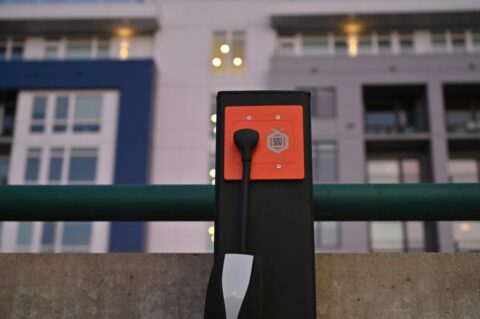
Nicholas Johnson founded a company because he lost a bet.
Johnson was having dinner with some investors in Lyt, a road congestion management company he had co-founded. As the dinner conversation meandered, it settled on EV charging and how best to bring it to multi-family housing.
Apartment dwellers who own EVs are often left with two less-than-ideal choices: public chargers or plugging their vehicles into regular 120-volt outlets, which adds about 3 to 5 miles of range per hour. Johnson wasn’t intrigued by the problem, so one of the people at dinner gave him a proposition.
“I got bet by one of our investors to drive to and from work, which was about 48 miles at the time, for six months charging my EV with nothing more than a Level 1 outlet,” Johnson told TechCrunch. “He said, ‘If you don’t need to plug in at a DC fast charger other than for weekend road trips, I win the bet and you have to build me a prototype.’ He won the bet, and I built him a prototype.”
That prototype would form the basis of a new startup, Orange Charger, where Johnson is now CEO. The company, which has sells landlords a 240-volt smart outlet among other products, has raised a $6.5 million oversubscribed seed round, Orange Charger exclusively told TechCrunch. The round was led by Munich Re Ventures and Climactic with participation by Baukunst, Crow Holdings, Lincoln Property Ventures, and Space Cadet Ventures.
Charging has long been the Achilles’ heel of electric vehicles, and few EV drivers are as well acquainted with it as apartment dwellers, many of whom aren’t guaranteed a place to charge at night. Today, a majority of EV charging is done at home, but most multi-family dwellings don’t have chargers or even outlets at every parking space. If EVs are going to reach mass adoption in the U.S., the 40 million people who live in multi-family housing will need a more convenient way to juice up.
Plenty of startups have popped up to solve the problem, and most of them focus on selling and installing enough charging equipment to serve a percentage of tenants. Even then, it can be a pricey proposition, often running a few thousand dollars per stall. Landlords are hesitant to install unless there are enough tenants with EVs. “When you’re doing like 100 or 200 parking spots in a multifamily, you really don’t want 200 cables laying on a parking lot, especially when on day one maybe like 10 to 20 are going to be used,” Johnson said. But at the same time, tenants might hesitate to buy EVs without a convenient place to charge them.
Orange Charger thinks it has a better solution, and it’s betting that landlords will prefer it. Rather than install a swarm of Level 2 chargers, which provide enough electrons for several days of daily driving, Orange Charger is offering 240-volt outlets that are packed with smarts. EV owners can plug in the portable Level 2 charger that often comes with their vehicle and activate the outlet using an app.
Orange Charger’s Level 2 outlets supply less power than a commercial unit, but still enough to add about 150 miles of range overnight. The lower power draw means that electricians can run thinner gauge wire, which Johnson said costs about a third less. “That savings per foot adds up really fast.”
The outlet design has been tested to withstand plugging in and out at least 10,000 times. “We didn’t want that experience everyone has had of plugging into an outlet in an airplane or a hotel and it just falls out.” Johnson said.
Orange Charger sells Level 2-capable outlets for $750, not including installation, which Johnson said is the company’s “main product.” It also offers Level 1-capable outlets for $600 and a full-freight Level 2 charger for $2,000.
Each of Orange Charger’s products has a circuit board inside that serves as a node on its mesh network, which can run over Wi-Fi or Bluetooth, and each outlet can still operate if the connection to the internet is broken, sending any session data to the cloud once connectivity is restored. “Imagine I can’t charge for five hours because somebody cut the wrong cable on our street,” Johnson said. “We wanted to make something that was robust.” So far, the company has been able to initiate over 99% of all attempted charging sessions, he added.
Orange Charger bills landlords a subscription fee that’s based on energy usage instead of the number of outlets installed. So far, the company has installed about 2,000 units nationwide.
“You have no downside to install 50 outlets day one,” Johnson said. “We only charge when the device is used.” It’s an approach that just might solve one vexing chicken-and-egg problem that drags on EV adoption.
